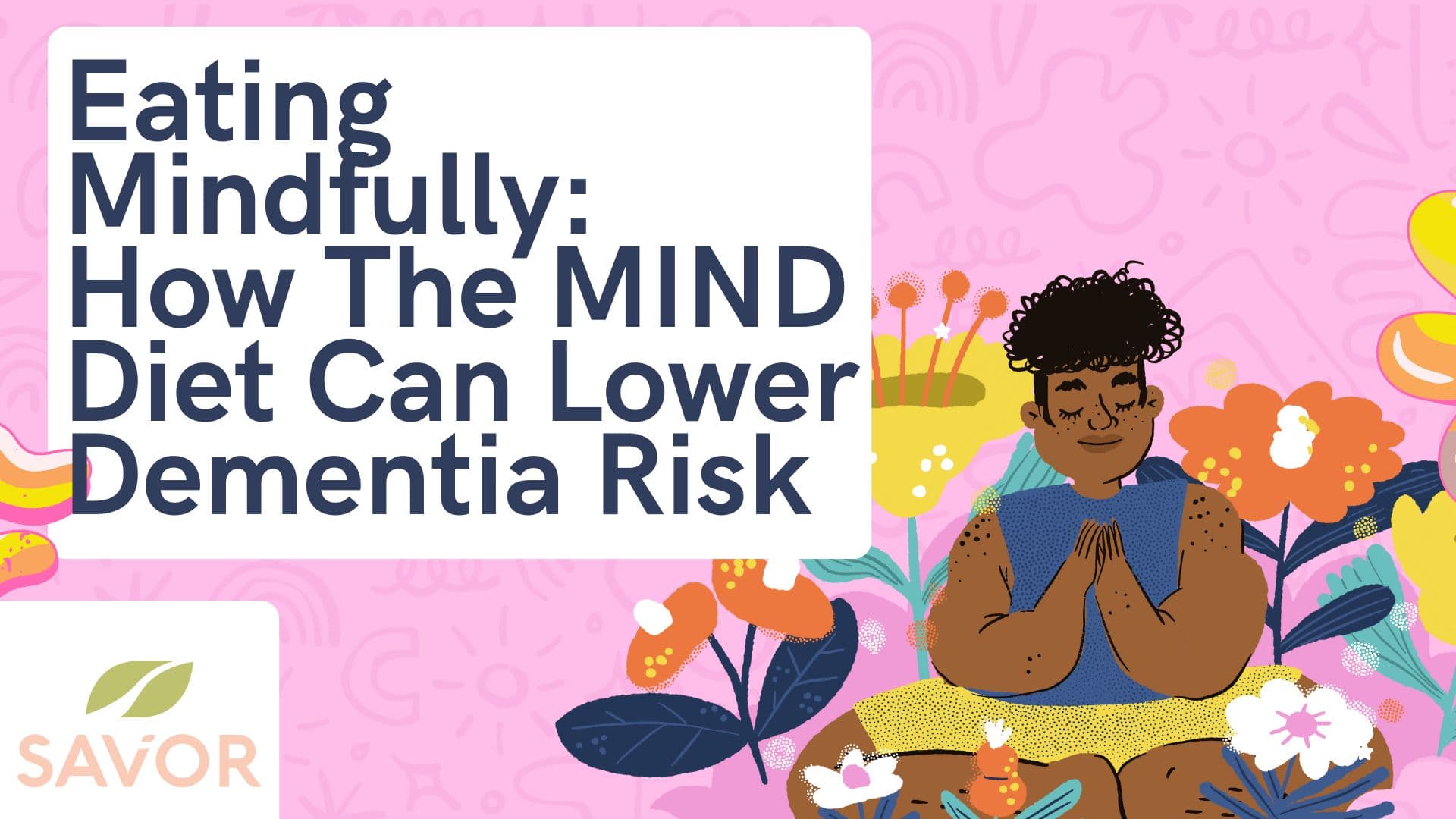Eating Mindfully: How The MIND Diet Can Lower Dementia Risk
Losing the ability to remember is a fear for many as they age. This can mean forgetting important details like where you live, who you are, or even your family and friends!

Eating Mindfully: How The MIND Diet Can Lower Dementia Risk
Losing the ability to remember is a fear for many as they age. This can mean forgetting important details like where you live, who you are, or even your family and friends!
However, new science is here to save the day, with the MIND diet. Researchers have tried and tested this hybrid health diet and produced results that suggests that it may play a role in dementia and Alzheimer’s prevention.

What Is The MIND Diet?
The MIND diet is short for Mediterranean-DASH Intervention for Neurodegenerative Delay. This fancy diet is a hybrid of 2 well known diets: the Mediterranean diet and the DASH diet (Dietary Approaches to Stop Hypertension).
The reason this diet is gaining traction for dementia treatment is because it focuses on nutrients specifically tied to brain health and cognitive function.

The Science Behind The MIND Diet
The reason why the MIND diet works boils down to its components, which include:
Flavonoids and polyphenols from fruits, vegetables, tea, and dark chocolate.
Folate from leafy greens and legumes.
Omega-3 fatty acids (especially DHA) from oily fish, seeds, and nuts.
B vitamins from legumes (beans, peas, lentils), nuts, seeds, dark leafy greens, and certain fruits like bananas and oranges.
Carotenoids from spinach and kale, yellow and orange vegetables like carrots and pumpkins, and colorful fruits such as tomatoes, mangoes, and cantaloupe.
Choline from soybeans (including edamame and tofu), cruciferous vegetables like broccoli and Brussels sprouts, legumes such as kidney beans and chickpeas, and nuts like almonds
Minerals like magnesium, potassium, and calcium from Celtic Salt, leafy greens and legumes
Compared to alternative diets, the MIND diet focuses on leafy greens and berries which offer brain boosting benefits and anti-inflammatory properties to shield the brain from neurodegenerative damage.

What Researchers Found
Now to put this diet to the test. A study, conducted by researchers at Yonsei University, South Korea, tracked over 1,31,000 adults aged 40 to 69 over a span of 13 years. What they found was that diets rich in whole foods, leafy greens, and healthy fats, especially the MIND diet, significantly reduced the risk of dementia by up to 28%.
On the other end of the spectrum, diets high in processed and inflammatory foods were linked to a 30% higher risk of dementia.
The researchers noted that this dementia risk increase from inflammatory diets were more pronounced in older adults past the age of 60, women, as well as non-obese individuals.

Maintaining The Mind
Another study was done with 809 participants in the Rush Memory and Aging Project. Researchers focused on the hippocampus, responsible for learning and memory. When it sustains damage in the form of hippocampal sclerosis (a severe loss of neurons in this region) it’s often linked to dementia. These cells typically don’t grow back, so preventing this neuron loss is very important.
Participants who adhered to the MIND diet the most had a 22% lower chance of having hippocampal sclerosis compared to those who did not adhere as much. They were also less likely to have hippocampal sclerosis alongside Limbic-predominant age-related TDP-43 encephalopathy (LATE disease), which was linked to Alzheimer’s. MIND dieters also had less neuron loss in the hippocampus.
The Study In The University of Hawaii
Researchers from the University of Hawaii analyzed data from nearly 93,000 U.S. adults who reported their dietary patterns during the 1990s.
In analyzing which participants were at higher risk for dementia and Alzheimer's, the MIND dieters performed better than other competing diets in terms of reducing dementia risk, with benefits seen among both younger and older participants.
The study found that those who followed the diet were shown to have anywhere between 9-13% of reduced risk! The percentage was noted to be higher for marginalized groups.
The study also found that the longer people followed the MIND diet, the greater the reduction of risk. Those who maintained the diet over a 10-year period had a 25% lower risk compared to those who didn’t.

What Foods Should You Focus On
So we have learned that the MIND diet yields beneficial results for people wanting to maintain their brain function as they age. Now, let’s dive deeper into what foods you can focus on:

Eat more of:
Leafy greens (daily)
Berries (more than two days per week)
Whole grains
Nuts and seeds
Beans
Legumes
Olive oil as main cooking fat

Eat Less Of:
Red and processed meats
Butter and stick margarine
Cheese (Especially full-fat variants)
Pastries and sweets
Fried and fast foods
Refined Sugars
Sources:
MSN: Can a simple diet change reduce chances of dementia, Alzheimer's disease?
Science Direct: Association of Mediterranean, high-quality, and anti-inflammatory diet with dementia in UK Biobank cohort
EatingWell: This Diet May Reduce the Risk of Neuron Loss and Dementia, New Study Says
New York Post: People who eat certain type of diet are at low risk for dementia, research shows
Check out Dr. Eddie Ramirez's social medias for expert health news:
Love great food and exclusive perks? Sign up as a Savor of Life member today and enjoy FREE FOOD with your main dish! Don't miss out—join now!
👉 Claim your reward here: Savor of Life Membership Offer
Planning an event? Let Savor of Life bring the flavors to you! From social gatherings to large celebrations, our catering services offer delicious, high-quality meals tailored to your needs.
📅 Book now and make your event unforgettable! → Savor of Life Catering
Ready to transform your wellness with specially made meals? Sign up for our Savor Transform 10-Day Challenge and enjoy exclusive perks, special offers, and unforgettable meals!
👉 Join now: Savor Transform